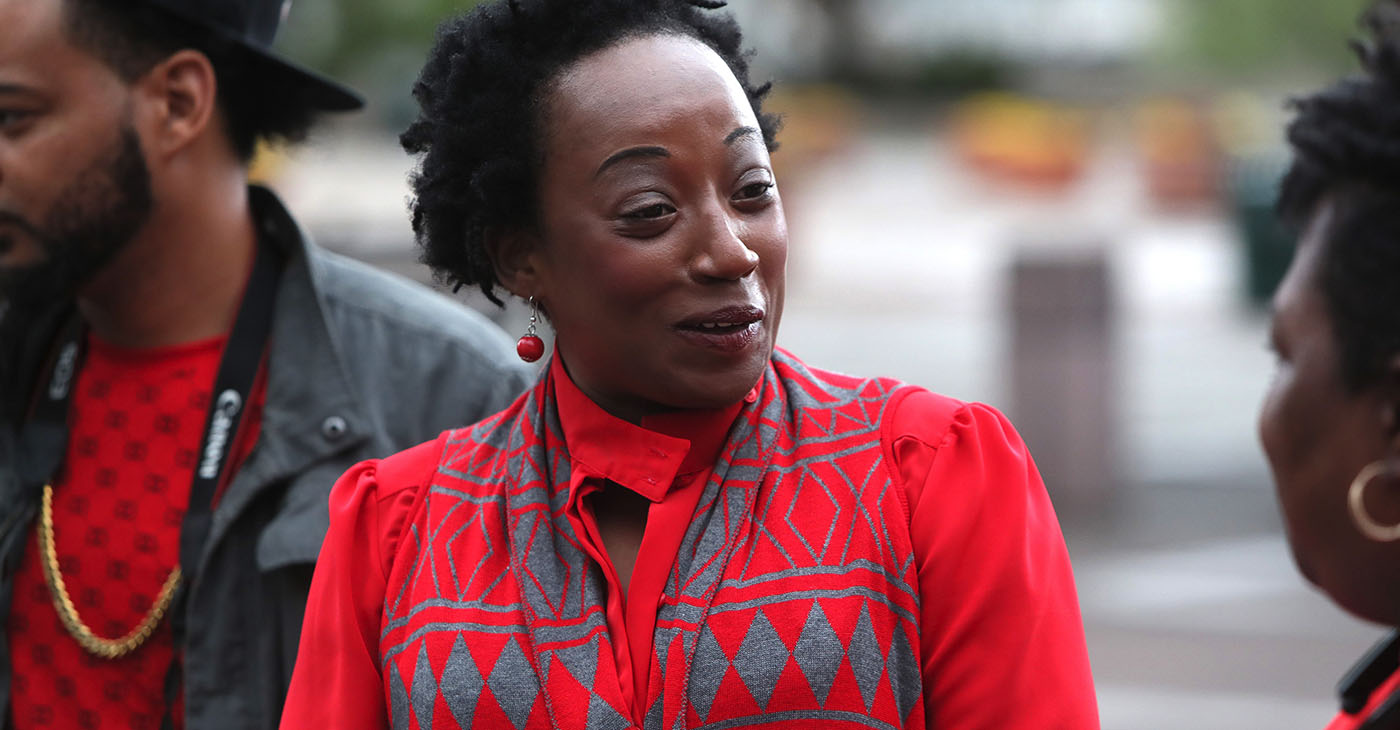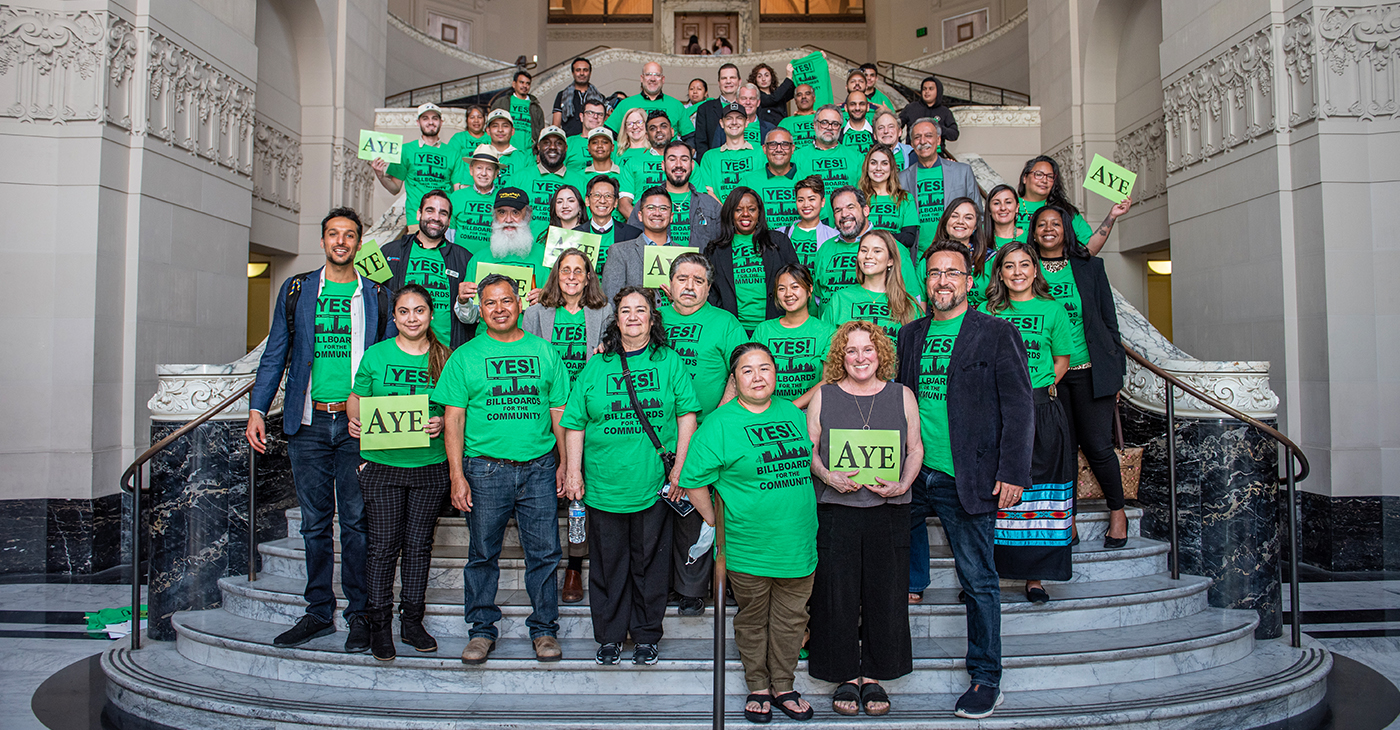Activism
Voting Error Leads to 6-Year Prison Sentence for Black Woman in Tennessee
District Attorney Amy Weirich, a Republican, has been touting the success of her case, gaining nationwide attention by conservative pundits. “What we had proved, we presented to that jury, and they listened to the evidence. They listened to the facts. They applied their common sense, and they returned the verdict of guilty,” she said in a statement to WREG, a Memphis TV station.

By Post Staff
Pamela Moses, a Black Lives Matter activist in Memphis, Tenn., was sentenced to six years in prison for attempting to register to vote.
Both her conviction last fall and her sentence on Feb. 4 have been met with furor by Black leaders and political progressives.
Janai Nelson, the associate director-counsel of the NAACP Legal Defense Fund, told NBC News it was another level of voter suppression aimed at breaking democracy in the U.S. today.
“Pamela Moses, a Black woman, has been sentenced to six years in prison because of a voting error,” Nelson’s tweet said. “Meanwhile, white individuals who are known to have committed blatant voter fraud have only received probation. There are two criminal justice systems in America.”
Referring to it as a ‘paper case,’ Josh Spickler, executive director of an advocacy group called Just City, wondered why it was prosecuted at all considering the spike in violent crime in Memphis.
“Elected officials have used incredible amounts of resources in a time when there’s a backlog in this justice system unlike any we’ve seen before. They use resources to try …(to) convict this woman for trying to vote,” he told the Memphis Commercial Appeal.
Moses, a former felon who wanted to run for mayor in 2019, tried to register to vote but was denied.
Believing that the denial was linked to miscalculating the terms of her sentence, Moses approached the department of corrections, where an official filled out the voter registration application for her, and then the county election commission signed off on her application.
What Moses didn’t know was, that under Tennessee law, her right to vote had been permanently revoked after her arrest in 2015 when she agreed to a felony plea deal because she couldn’t afford a $500,000 bond. “They never mentioned anything about not voting, being able to vote … none of that,” Moses said.
Moses would pay dearly for what she didn’t know because once the error on her voter registration application was discovered, the election commission, as was routine, notified the district attorney’s office.
What was not routine was that Moses would then face charges of perjury and falsifying an election document. This time, Moses refused to plead guilty because she didn’t believe she had done anything wrong.
District Attorney Amy Weirich, a Republican, has been touting the success of her case, gaining nationwide attention by conservative pundits. “What we had proved, we presented to that jury, and they listened to the evidence. They listened to the facts. They applied their common sense, and they returned the verdict of guilty,” she said in a statement to WREG, a Memphis TV station.
In last November’s trial, Moses’ defense showed that the errors were made by government authorities, but the jury and the judge believed that Moses had knowingly attempted to subvert the law.
“I did not falsify anything,” Moses said at her sentencing hearing. “All I did was try to get my rights to vote back the way the people at the election commission told me and the way the clerk did.”
Judge Mark Ward wasn’t having it.
“You tricked the probation department into giving you documents saying you were off probation,” said Ward, who would consider granting her probation after she serves nine months.
Moses’ lawyer, Bede Anyanwu, told the Washington Post her client would appeal. “This case is one about the disparity in sentencing and punishment – and one that shouldn’t have happened.”
According to Sam Levine, an opinion writer for The Guardian, “The Republicans who actually cast illegal ballots in the name of relatives they definitely knew were dead each received light sentences. The Black woman who thought she was allowed to register to vote is set to spend the next 72 months in prison.”
At a press conference following her sentencing, Moses, 44, was joined by about a dozen supporters holding signs despite an ice storm “Trying to vote is not a crime” and “Justice for Pamela,” signs read.
In 2015, Moses pleaded guilty to two felonies and three misdemeanors, which led to her receiving probation for seven years. The felony convictions made her ineligible to vote in Tennessee permanently.
Depending on the offense, Tennessee is one of several states that disenfranchise former felons. California is one of 21 states where disenfranchisement ends after incarceration is complete. Maine, Vermont and Wash., D.C., allow prisoners to cast absentee ballots.
“I relied on the election commission because those are the people who are supposed to know what you’re supposed to do,” Moses told station WREG in Memphis. “And I found out that they didn’t know.”
Reports from The Memphis Commercial Appeal, The Guardian, The Washington Post, BET, WREG-TV and MSNBC were the sources for this report.
Activism
Oakland Post: Week of July 24 – 30, 2024
The printed Weekly Edition of the Oakland Post: Week of July 24 – 30, 2024

To enlarge your view of this issue, use the slider, magnifying glass icon or full page icon in the lower right corner of the browser window. ![]()
Activism
Oakland Post: Week of July 17 -23, 2024
The printed Weekly Edition of the Oakland Post: Week of July 17 -23, 2024

To enlarge your view of this issue, use the slider, magnifying glass icon or full page icon in the lower right corner of the browser window. ![]()
Activism
Community Celebrates Historic Oakland Billboard Agreements
We, the Oakland Billboard Economic Development Coalition, which includes Oakland’s six leading community health clinics, all ethnic chambers of commerce, and top community-based economic development organizations – celebrate the historic billboard agreements approved last year by the Oakland City Council. We have fought for this opportunity against the billboard monopoly, against Clear Channel, for five years. The agreements approved by Council set the bar for community benefits – nearly $70 Million over their lifetime, more than 23 times the total paid by all previous Clear Channel relocation agreements in Oakland combined.

Grand Jury Report Incorrect – Council & Community Benefit
We, the Oakland Billboard Economic Development Coalition, which includes Oakland’s six leading community health clinics, all ethnic chambers of commerce, and top community-based economic development organizations – celebrate the historic billboard agreements approved last year by the Oakland City Council. We have fought for this opportunity against the billboard monopoly, against Clear Channel, for five years. The agreements approved by Council set the bar for community benefits – nearly $70 Million over their lifetime, more than 23 times the total paid by all previous Clear Channel relocation agreements in Oakland combined.
Unfortunately, a recent flawed Grand Jury report got it wrong, so we feel compelled to correct the record:
- Regarding the claim that the decision was made hastily, the report itself belies that claim. The process was five years in the making, with two and a half years from the first City Council hearing to the final vote. Along the way, as the report describes, there were multiple Planning Commission hearings, public stakeholder outreach meetings, a Council Committee meeting, and then a vote by the full Council. Not only was this not hasty, it had far more scrutiny than any of the previous relocation agreements approved by the City with Clear Channel, all of which provide 1/23 of the benefits of the Becker/OFI agreements approved by the Council.
- More importantly, the agreements will actually bring millions to the City and community, nearly $70M to be exact, 23 times the previous Clear Channel relocation agreements combined. They certainly will not cost the city money, especially since nothing would have been on the table at all if our Coalition had not been fighting for it. Right before the decisive City Council Committee hearing, in the final weeks before the full Council vote, there was a hastily submitted last-minute “proposal” by Clear Channel that was debunked as based on non-legal and non-economically viable sites, and relying entirely on the endorsement of a consultant that boasts Clear Channel as their biggest client and whose decisions map to Clear Channel’s monopolistic interests all over the country. Some City staff believed these unrealistic numbers based on false premises, and, since they only interviewed City staff, the Grand Jury report reiterated this misinformation, but it was just part of Clear Channel’s tried and true monopolistic practices of seeking to derail agreements that actually set the new standard for billboard community benefits. Furthermore, our proposals are not mutually exclusive – if Clear Channel’s proposal was real, why had they not brought it forward previously? Why have they not brought it forward since? Because it was not a real proposal – it was nothing but smoke and mirrors, as the Clear Channel’s former Vice President stated publicly at Council.
Speaking on behalf of the community health clinics that are the primary beneficiaries of the billboard funding, La Clinica de la Raza CEO Jane Garcia, states: “In this case, the City Council did the right thing – listening to the community that fought for five years to create this opportunity that is offering the City and community more than twenty times what previous billboard relocation agreements have offered.”
Oakland Billboard Economic Development Coalition
| Native American Health Center | La Clínica de la Raza | West Oakland Health Center |
| Asian Health Services | Oakland LGBTQ Center | Roots Community Health Center |
| The Unity Council | Black Cultural Zone | Visit Oakland |
| Oakland African American Chamber of Commerce | Oakland Chinatown Chamber of Commerce | Oakland Vietnamese Chamber of Commerce |
| Oakland Latino Chamber of Commerce | Building Trades of Alameda County | (partial list) |
-

 Arts and Culture3 weeks ago
Arts and Culture3 weeks agoRooted in Tradition: The Intricate History of Black Hair Braiding
-

 Bay Area4 weeks ago
Bay Area4 weeks ago“I Will Not Be Bullied,” Says Oakland Mayor Sheng Thao
-

 Bay Area2 weeks ago
Bay Area2 weeks agoPG&E Increases Rates While Bay Area Households Are Struggling to Stay Afloat
-

 Business3 weeks ago
Business3 weeks agoGov Newsom: Raising Fast Food Minimum Wage to $20 Pays Off as Jobs Multiply in Industry
-

 Activism4 weeks ago
Activism4 weeks agoOpponents of Mayor Sheng Thao Are Calling on Her to Resign Following FBI Raid
-

 Bay Area2 weeks ago
Bay Area2 weeks agoJuneteenth Mass Shooting Suspect Charge with Multiple Counts of Felony Assault by Alameda County DA Pamela Price
-

 Community1 week ago
Community1 week agoHundreds Come to Jehovah’s Witnesses’ Assembly Hall for Three-Day Program of ‘Good News’ in Fremont
-

 Activism4 weeks ago
Activism4 weeks agoOakland Coliseum Sale to AASEG: A Model for Community Development and Inclusion




















































